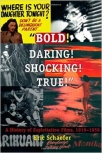Since I was old enough to remember it (about 1949), Old Time Radio -- that is the programs that filled up the nation's airways starting in the 1920s and running through a good part of the fifties when they were eclipsed by television on the one hand and music radio on the other -- have been an especially fun hobby of mine.
At one point in my work career I was locked in the basement of the building with no outside windows and an exit reached by a long walk down a hallway, where I "guarded" a server room. My sole job was to be there in case anything went wrong with any of the servers. It never did, so I found myself needing to fill up eight hours of work each day for five days a week. It was in a basement so I couldn't get a radio signal, and they wouldn't give me a television, so one of the only forms of entertainment available to me was Old Time Radio. I made a bunch of CDs of such shows as The Life of Riley, Gangbusters, Red Ryder, Mister District Attorney, Boston Blackie, Lum & Abner, The Great Gildersleeve, Terry and the Pirates, Lights Out, The Inner Sanctum, The Whistler... Well, the list goes on and on, and listening to those old shows, many of which I remembered listening to as a child, like Baby Snooks (I was in the radio audience the night Fanny Brice died--May 29, 1951), not only served as a rollercoaster down memory lane, but actually kept me relatively sane during that period of time.
So stories about the days of the Theatre of the Mind tend to grab my attention, as did this one. It's about the great radio pioneer Norman Corwin striving to have "colorblind" radio -- blacks were as systematically excluded from radio as they were from other forms of entertainment.
The apex of Corwin’s radio career coincided with a profound shift in America’s dominant racial formation, the beginnings of “colorblindness.” By colorblindness, I mean the belief that if individuals and institutions ignored skin color as a signifier and eliminating race as an official category of identity—particularly within governmental institutions—it would cease to matter in American life and all groups would have equitable access to the privileges, opportunities, and freedoms afforded by citizenship.Corwin's push to have black persons trained to talk on the radio backfired in some ways led to the opposite result, as this article explains.
The article is On the Lower Frequencies: Norman Corwin, Colorblindness, and the “Golden Age” of U.S. Radio and it makes for an interesting read and presents a real and unique window into what was going on behind the scenes in radio.
The more things change, the more they stay the same, I guess.











0 Comments:
Post a Comment